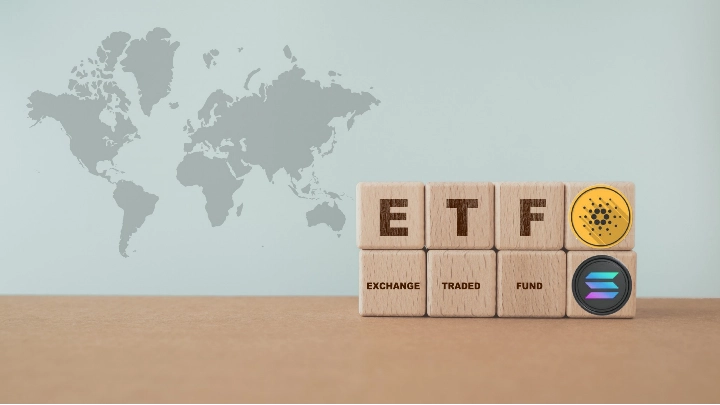- Despite the global markets plunging, crypto ETFs continue to perform admirably – especially Down Under.
- The success of spot Bitcoin ETFs in particular has investors salivating at the prospect of more coins being converted to traditional financial products.
- However, experts among the community believe that approval for tokens like SOL and ADA is far-fetched, due to a lack of market exposure and demand.
Crypto ETFs have been selling like hotcakes ever since a spot Bitcoin fund was approved by the SEC in January earlier this year. Institutional interest in the scene came flooding in, and as a result, Bitcoin reached a new all-time high and is still trading 93% higher than it was this time last year. Spot BTC ETFs have attracted billions in inflows – with products like BlackRock’s IBIT boasting around US$20 billion (AU$30.5 bn) in assets under management.
Related: Australian Bitcoin ETFs See Net In-Flows as Investors Ignore Market Crash and Panic
Lack of “Market Surveillance” May Prevent SEC From Approving Next ETFs
The natural next question among the community was: “Which crypto should have an ETF next?”
Replicating Bitcoin’s success across some of the blockchain world’s brightest projects is a clear hope for many investors. Onboarding thousands of new institutions into a DeFi ecosystem could be the catalyst to propel a platform like Solana or Cardano into the mainstream.
Advertisement

However, achieving approval for a spot crypto ETF to start trading on the US markets isn’t that simple – especially while the Securities and Exchange Commission (SEC) are convinced most digital assets are unregistered securities.
Head of Investment Research at Sygnum Bank, Katalin Tischhauser, outlined several issues that cryptos like ADA and SOL might encounter on their path toward a spot ETF.
The biggest obstacle is the lack of altcoins available for trade on regulated markets like the Chicago Mercantile Exchange (CME) or the New York Stock Exchange (NYSE). This was a key to Bitcoin and Ether seeing approval – although you could never directly trade these assets, before the ETF greenlight investors could gain exposure to the coins through futures funds (think Grayscale Bitcoin Trust).
Such financial products do not yet exist in the US for Solana, Cardano or other cryptocurrencies, so Tischhauser believes the SEC will be tentative to approve an ETF without a market track record. This means that expansion of assets available via spot crypto funds may be years away – if it ever happens.
Even if ADA, SOL and friends managed to see SEC approval, the market may not be as keen as some believe.
We do not think ETFs beyond Bitcoin and Ethereum would meet much demand. Ethereum’s name recognition is only half of Bitcoin’s, and other tokens have minimal name recognition outside the crypto market.
 Katalin Tischhauser, Head of Investment Research at Sygnum Bank
Katalin Tischhauser, Head of Investment Research at Sygnum Bank
VanEck Goes Against Tide, Says Altcoin ETFs Are Coming
Investment managers VanEck disagree with the growing sentiment that altcoin ETFs may not be on the agenda anytime soon. Last week, the company’s Head of Digital Assets Research, Matthew Sigel, was bullish on the potential demand and growth of alternative crypto funds.
We disagree with the notion that Bitcoin and Ethereum will be the only ETFs. The market in Europe already boasts a variety of crypto ETPs, including single coin and basket options.
 Matthew Sigel, VanEck Head of Digital Assets Research
Matthew Sigel, VanEck Head of Digital Assets Research
VanEck put its money where its mouth is by becoming the first company to file for a spot Solana ETF.
Related: Chainalysis Report Exposes Myths on Crypto’s Role in Crime
Although Sygnum Bank is a little bearish on SOL ETFs, the same is not true for the currently underperforming market for Ethereum ETFs. The team believes that, if demand starts to grow, a supply shock could hit ETH that could cause a 40-50x boost in market cap from only US$1 billion (AU$1.5 bn) worth of inflows.




